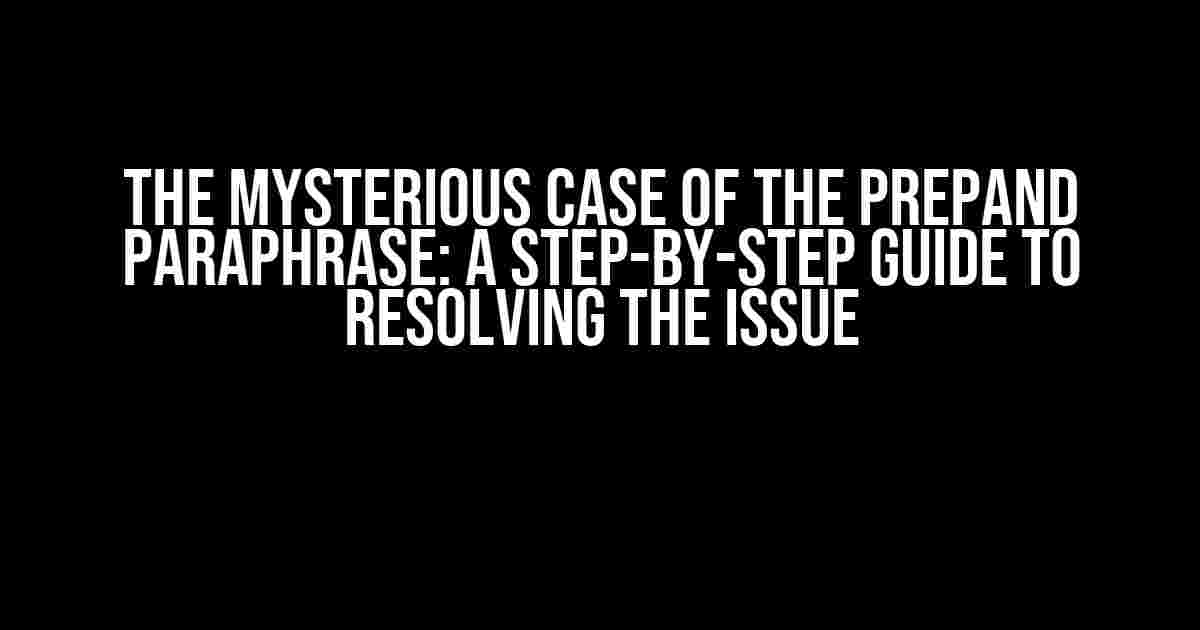Are you tired of seeing “A prepand *Paraphrase*” appear every time you run your code, instead of the actual paraphrased sentence you were expecting? You’re not alone! This frustrating issue has been plaguing developers for far too long. But fear not, dear reader, for we’re about to embark on a journey to uncover the root cause of this problem and provide a comprehensive solution to get your paraphrasing back on track.
Understanding the Prepand Paraphrase Conundrum
Before we dive into the fix, it’s essential to understand what’s happening behind the scenes. When you run your code, the prepand paraphrase is essentially a placeholder value that’s being inserted instead of the actual paraphrased sentence. This can occur due to a variety of reasons, including:
- Incorrect syntax or formatting in your code
- Missing or incorrect dependencies
- Conflicting libraries or plugins
- Data type mismatches
diagnosing the Issue
To identify the root cause of the problem, follow these steps:
Check your code for syntax errors: Review your code line by line to ensure there are no typos, missing brackets, or incorrect punctuation. Use a code editor with syntax highlighting to help you identify any mistakes.Verify dependencies and libraries: Double-check that all required dependencies and libraries are installed and up-to-date. Make sure there are no conflicts between different versions or libraries.Test data types: Ensure that the data types you’re working with are correct and consistent. This includes checking the data type of variables, function inputs, and outputs.
Resolving the Prepand Paraphrase Issue
Now that we’ve diagnosed the potential causes, let’s get to the solution! Here’s a step-by-step guide to resolve the prepand paraphrase issue:
Step 1: Update Your Code Syntax
<!-- Update your code syntax to ensure correct formatting --> <?php // Update your code to use the correct syntax $paraphrased_sentence = paraphrase_function($input_text); echo $paraphrased_sentence; ?>
Step 2: Check and Update Dependencies
Verify that all required dependencies are installed and up-to-date. If you’re using a package manager like npm or pip, run the following commands:
<!-- Update dependencies using npm --> npm update <!-- Update dependencies using pip --> pip install --upgrade paraphrase-library
Step 3: Ensure Correct Data Types
Verify that data types are correct and consistent throughout your code. Use type hints and type checking to ensure accuracy:
<!-- Use type hints to specify data types -->
function paraphrase_function(string $input_text): string {
// Code to paraphrase the input text
return $paraphrased_text;
}
Additional Troubleshooting Tips
If you’ve followed the above steps and the issue still persists, try these additional troubleshooting tips:
Clear your cache: Clearing your cache can help resolve issues caused by outdated or cached data.Check for plugin conflicts: If you’re using plugins or extensions, try disabling them one by one to identify any potential conflicts.Consult the documentation: Review the documentation for your specific programming language, framework, or library to ensure you’re using the correct syntax and formatting.
Conclusion
In conclusion, the mysterious case of the prepand paraphrase can be resolved by following a systematic approach to diagnosing and resolving the issue. By checking your code syntax, verifying dependencies, and ensuring correct data types, you can get your paraphrasing back on track. Remember to stay patient, persistent, and methodical in your troubleshooting approach, and you’ll be paraphrasing like a pro in no time!
| Troubleshooting Step | Solution |
|---|---|
| Syntax Errors | Check code for syntax errors, use code editor with syntax highlighting |
| Dependency Issues | Verify dependencies, update if necessary, check for conflicts |
| Data Type Mismatches | Use type hints, type checking, and ensure consistent data types |
By following this comprehensive guide, you’ll be well on your way to resolving the prepand paraphrase issue and getting back to creating high-quality, paraphrased content. Happy coding!
Frequently Asked Question
Get the answers to your most pressing questions about paraphrasing!
Why does the original sentence keep showing up instead of the paraphrased one?
This might be because the paraphrasing model is not properly trained or configured. Make sure to review your model’s settings and training data to ensure it’s producing accurate paraphrases.
Is there a bug in the code that’s causing this issue?
It’s possible! Double-check your code for any syntax errors or logical mistakes. Also, ensure that the paraphrasing function is being called correctly and that the output is being properly displayed.
Can I try a different paraphrasing tool or API to see if that solves the problem?
Absolutely! If you’re using a specific tool or API, try switching to a different one to see if the issue persists. This can help you determine if the problem is specific to the tool or a more general issue with your code or approach.
What if I’ve tried everything and the problem still persists?
Don’t worry, we’ve got your back! If you’ve exhausted all other options, consider seeking help from a developer community or a professional paraphrasing expert. They can help you identify the root cause of the issue and provide a solution.
Are there any best practices I can follow to avoid this issue in the future?
Yes, indeed! To avoid this issue, make sure to thoroughly test your paraphrasing code, use high-quality training data, and continuously evaluate and refine your model’s performance. Additionally, consider implementing error handling and logging mechanisms to catch any potential issues early on.
